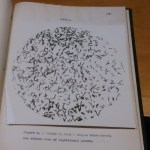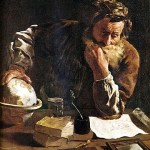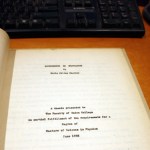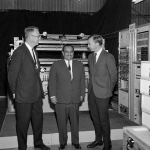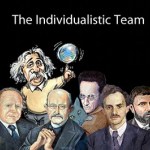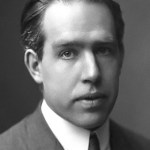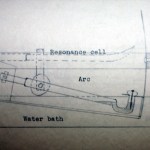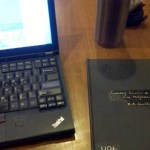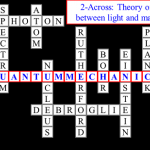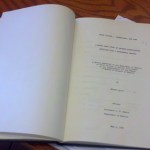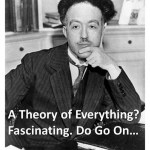History of Science
A couple of days ago, John Scalzi posted a writing advice open thread, asking people to share the best advice they'd gotten on the craft of writing. There's a lot of good stuff in there, much of it fairly specific to fiction writing-- stuff about plotting, the use of synonyms for "said," how to keep track of who's speaking, etc. As someone who's very much an outsider to that side of the writing business, it's interesting to read, but not that directly useful (I do have long stretches of dialogue in the How-to-Teach books, and occasionally needed to worry about the "said" thing there, but that…
Back in the fall, I did a bunch of write-ups of old Master's theses that we found when clearing some space in a storage room. I got away from this because I was busy working on the book, but I have a few more that I pulled out to look at, and since all the other topics sucking up Internet energy at the moment are stupid or depressing, it seems like a good time to get back to these.
So, this is a thesis from 1934 by a fellow named Thomas Dietz, a combination of names that is common enough to make him less Google-able than you might want. This does seem to have been moderately significant work…
Ashutosh Jogalekar has a response to my post from yesterday complaining about his earlier post on whether multiverses represent a philosophical crisis for physics. I suspect we actually disagree less than that back-and-forth makes it seem-- he acknowledges my main point, which was that fundamental theoretical physics is a small subset of physics as a whole, and I don't disagree with his point that physics as a discipline has long been characterized by a reductionist sort of approach-- always trying to get to smaller numbers of fundamental principles.
Our real point of disagreement, I think,…
The very last section of the book-in-progress (at least the draft that's with my editor right now...) is titled "Science Is Never Over," and talks about how there are a nearly infinite number of phenomena that you can investigate scientifically. The universe is a never-ending source of amazement and wonder, with surprisingly rich dynamics in the simplest of things. I mean, look at the thousands of words I've gotten out of talking about sticky tape...
This is why I sigh heavily whenever I see a title like Ashutosh Jogalekar's "Should Physicists Stop Looking for Fundamental Laws. This is, at…
This past Monday, a lot of people in my social media feeds were passing around this Benjamin Bratton piece about the problems with TED, blasting the whole phenomenon as "placebo technoradicalism." The whole thing, he claims, is shallow pseudo-inspirational bullshit that makes people feel nice, but doesn't actually lead anywhere. As he notes at the opening, most of the grand promises made in TED talks have yet to pan out: "So much potential and enthusiasm, and so little actual change."
I found this kind of amusing, because a day earlier the link being passed around a lot of my social media…
I sent off the complete draft of the book-in-progress yesterday, somewhere between 12 and 36 hours ahead of my contractual deadline. Which I suppose makes it a book-in-process now, maybe. That process may still include re-writes, though, so my work probably isn't done yet.
The final draft, according to Word anyway, comes to 253 pages (space-and-a-half) and 96,807 words. I don't remember the word count from the original contract, but this is more than that. Which is pretty typical of my writing, really.
Because I wrote it down as part of the final checks, here's the approximate table of…
Dmitrii Ivanovich Mendeleev hit on the idea of the Periodic Table as an organizing theme for a textbook he began writing in 1868. He did some work on refining the idea, and in 1870 presented a paper on it to a meeting of the Russian Chemical Society.
Well, actually, that's not quite true-- Mendeleev did write up a paper for Russian chemists in 1870, but he didn't present it himself. He had a friend do the presentation in his stead. Mendeleev himself was out of town, inspecting artisanal cheese-making operations for the Russian government.
I talked a bit last week about Eureka moments and…
We had a very late colloquium talk on Monday-- on the next-to-last day of our fall term exam period, so student turnout was a little disappointing-- by the science historian Dieter Hoffmann from the Max Planck Institute for the History of Science, who was in town visiting a colleague in our history department. He told us the story of Fritz Reiche, a student of Max Planck's whoc ended up having a Union College connection (which was a part of why Hoffmann wanted to give the talk).
Reiche did his Ph.D. under Planck, in 1907, then spent time at a few other great institutions in Germany,…
From The Fly in the Cathedral, Brian Cathcart's history of the experiments that led up to the splitting of lithium nuclei by accelerated protons in the Cavendish Laboratory in 1932. One of the incidents along the way was the discovery of the neutron by James Chadwick, also in 1932. In describing Chadwick, who was Ernest Rutherford's assistant director in the years in question, Cathcart writes:
Chadwick's diffidence was familiar to all the students. [Thomas] Allibone was only one of several to describe taking a problem to the assistant director, explaining it at length and then leaving his…
I'm not talking about the tv show Eureka here, which was mostly silly fluff but not especially problematic. I'm talking about the famous anecdote about Archimedes of Syracuse, who supposedly realized the principle that bears his name when slipping into a bath, distracted by a problem he had been assigned by his king. On realizing the solution, he (supposedly) leaped out of the tub, yelling "Eureka!" (usually translated as "I found it!") and ran home naked, because he was so excited about the discovery that he forgot to dress.
As you know, I'm working on a book about the relationship between…
A couple of Mondays ago, I was at work and got the dreaded phone call from day care. "[The Pip]'s got conjunctivitis again. It's really bad, and he needs to go home right away."
Admittedly, this isn't the very worst phone call a parent could receive, but it's very much Not Good. Conjunctivitis means a trip to the doctor for antibiotics and eye drops (which The Pip HATES), and being sent home knocks out not only the rest of that day, but the entire next day, as he has to be on medication for at least 24 hours before he can return to day care.
The call came in around 10:00, and I had a class to…
One of the interesting things about the pile of old theses we found in the basement is the opportunity to look at things that nobody believes any more. Past installments of the Old Thesis Club have shown people fumbling toward an understanding of quantum physics via electron scattering and spectroscopy, but in both of those cases, they were working toward a correct theory. In this edition, we look at an investigation of a theory that's been wholly discredited.
The general category of the experiment isn't problematic-- it's basically a test of the equivalence principle, the idea that the…
In 1967, a team of scientists hauled a big pile of gear-- electronics, particle detectors, a giant slab of iron-- into the burial chamber at the base of one of the pyramids at Giza. This sounds like a scene from a science fiction or fantasy novel-- throw in the fact that their first attempt was interrupted by the Six Day War and you've got an element of a Tim Powers secret history story-- but the goal wasn't the opening of an interdimensional portal or the raising of the dead. Instead, they were using astrophysics to do archaeology: their detectors measured the number of cosmic ray particles…
An article titled "Individualism: The legacy of great physicists," by Ricardo Heras. crossed my various social media feeds a half-dozen times on Tuesday, so I finally broke down and read it, and I'm puzzled. The argument is very straightforward-- single-author publications used to be common, now they're not, this might indicate a lack of truly independent work, that would be bad-- but a lot of it is at odds with my reading of the relevant history.
The most jarring thing about the article is the "Individualistic Team" graphic above, including a bunch of pictures of famous physicists who are…
It's that time of year again when people start thinking about Halloween costumes-- SteelyKid is apparently planning to re-use her Peter Pan outfit from last year-- and the conceptual costumes post from a while back has proved enduringly popular at this time of year. If you're not into conceptual art, though, maybe some historical cosplay is more your thing, so here are some totally serious ideas if you want to go to your local physics department's Halloween party as one of the great physicists of the last half-millennium.
Sexy Niels Bohr
This was actually the trigger for this post, when…
Having spent a bunch of time talking about heavy stuff in the science blogging community, let's unwind a bit and kick the week off with a look back at an old Master's thesis. This one is from 1932, and is almost certainly a draft copy, because it's extremely cheaply bound in cardboard with the title hand-lettered on the front. There are a few corrections in the text as well, which is very short-- just 11 pages, not counting the figures at the end.
Again, this is interesting as much for what it doesn't contain as what it does. The subject matter is pretty mundane by modern standards-- just…
As noted in a previous post on Monte Carlo simulation in 1960, we recently came into possession of a large box of old Master's theses. The bulk of these are from the 50's and 60's, but there are some going back much farther. As I pass these every day I'm in the office, I thought it might be amusing to take a look at these for the blog, now and again. I don't plan to do a detailed examination of the quality of the science (at least, not necessarily), but to use this to look at how things have changed over the decades.
The first of these, pictured above, is one of the oldest: Secondary Emission…
The following is the approximate text of the talk I gave at TED@NYC last night. Approximate, because I'm somewhat prone to ad-libbing when speaking, and may have changed a few things here and there. I don't really know, because I'm scheduling this post on Tuesday morning, before the actual event, using the draft text I've been rehearsing with. But this will give you something to read while I drive back home from The City, and I can provide a more detailed recap later.
----
I’m going to tell you the most amazing thing I know, which is this: everything in the universe, from light, to electrons…
We cleared a bunch of space in our deep storage area over the summer, and one of the things we found was a box full of old student theses from the 1950's and 1960's. The library already had copies of them, but I thought it was sort of cool to have a look into the past of the department, so we put them up on a shelf in the office. Yesterday, I was glancing over this, and spotted a thin volume, pictured in the "featured image" above, which was a Master's thesis from 1960 (when we used to give MS degrees in physics...) titled "A Monte Carlo Study of Neutron Scintillation Detection with a…
After a nice, relaxing weekend in Ithaca without the kids, I've returned to a crazy hectic Monday, with no free time to blog, despite a couple of things that I vaguely need to post. Lacking time, though, I'll just give you this image of Condescending Louis de Broglie, an idea that sprang to mind when I ran across the original image and wouldn't go away. This is, obviously, an analogy to the condescending Wonka meme, and derives primarily from the faintly amused look on de Broglie's face in this obviously posed publicity photo from sometime in the 1930's.
A theory of everything? How…
